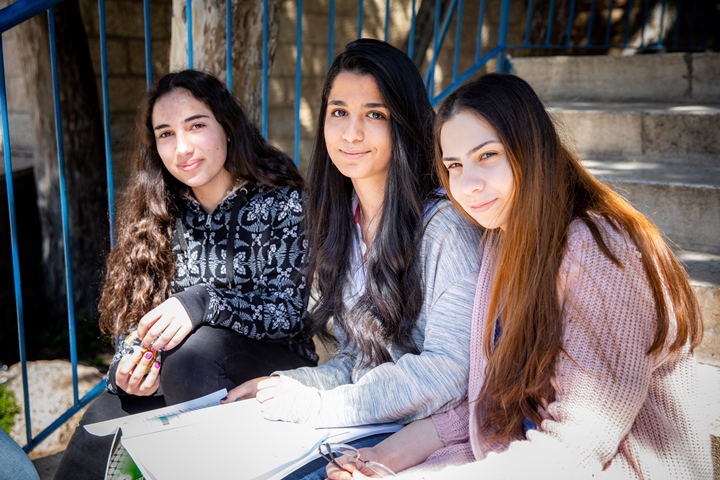Girls and boys in Palestine grow up in the context of a political conflict. That implies stressful situations, sometimes on an almost daily base. The economical and political situation in the Palestinian society is challenging as well.
Given this background, Talitha Kumi seeks to provide a safe setting where young people can learn and develop.
The Educational Centre of Talitha Kumi is located in Beit Jala close to Bethlehem. The school provides classes at all educational levels, from first grade to high-school level. Our complex also includes a kindergarten, a community college, a boarding school for girls, as well as a large guest house. We currently have 700 students registered at the school, 135 children visiting the kindergarten. 30 percent of the kids are Christians, 70 percent are Muslims. About 100 students attending the Community College. Since 2017 Talitha Kumi is recognised as Exzellente Deutsche Auslandsschule.
Empowerment of girls
Situated ten kilometers south of Jerusalem, Talitha Kumi was built on a small hill and is surrounded by woodland. The school takes its name from the Aramaic for “Get up, girl!” (Mark 5:21-24). This phrase, first uttered by Jesus, has been our mandate and task ever since the school was founded in 1851, making it the oldest Protestant school in Palestine. Our guiding principle is the message of peace as proclaimed in the Gospel.
The empowerment of girls still is one of our core aims. The school provides equal learning opportunities for girls and boys and supports their talents. The school’s girl football team is joined by very talented, ambitious and proud girls. Strong personalities already, they have good chances becoming selfconscious and strong young women. Talitha Kumi is a pioneering co-educational school in Palestine, providing a setting where boys and girls have been able to learn side by side since 1980.
Mediation and Peace Building
It is a sad fact that many schoolchildren are exposed to violence. It goes without saying that violence in families or confrontations with soldiers cause agressions that sometimes end up in the playground. For this reason, we began training students as mediators in 2007. Students learn to mediate in conflicts, prevent violence, and help the parties reach a solution that both sides support. After completing their program, our goal is that they should become active mediators for younger students, promote diplomacy, and avert violence. Moreover, we would like to give them a means of conflict resolution which they can readily apply outside our school environment, too.
German and Palestinian Secondary Education Certificates
Since the 2008/09 school year, Talitha Kumi has been part of the international network of German Foreign Schools. We follow the Palestinian curriculum in elementary school and add German as a foreign language in second grade. From seventh grade onwards, students can choose between two different paths: the national curriculum or the international curriculum. The national curriculum leads to the Palestinian high school degree (Tawjihi), while the international program concludes with the German International Abitur (DIAP). The DIAP is recognized worldwide, paving the way for students to study abroad. The very basics of English and German are already taught in Kindergarten. Hebrew is offered as an optional language class starting in grade seven.
Sponsors and Partners
The Berlin Mission is the official sponsor of Talitha Kumi and has been responsible for all decisions regarding personnel, administration and finances in cooperation with the German Federal Office of Administration. It shares the educational responsibility with the Evangelical Lutheran Church in Jordan and the Holy Land (ELCJHL). The church supports three schools. Its congregations and schools are sponsored in Germany by the Jerusalemsverein (Jerusalem Society).
The purpose of the Berlin Mission is to maintain and develop partnerships between the Evangelical Church Berlin-Brandenburg-Silesian Upper Lusatia, the Protestant Church of Anhalt, and other churches worldwide. Hence its work in the Middle East is supported by its sponsoring churches. However, in order to continue its wide variety of activities abroad, the Berlin Mission increasingly needs the financial support of private and institutional donors.
www.berliner-missionswerk.de/english-information/
www.jerusalemsverein.de
www.elcjhl.org

